Kevin Durant Is All That Separates the Warriors From Survival and Defeat

When an injury lingers in the NBA, the hobbled party is unfailingly asked for self-assessment—to appraise their health in percentage as if they were privy to some unseen progress bar. Is it even possible to know what it feels like to be 80% of the way back from a torn ACL? To experience, with such accuracy, a 60% recovery from a stress fracture? It’s a preposterous exercise indulged for one reason, and one reason only: because having some information is better than having none. Anything beats a void, even some arbitrary number plucked from thin air.
The alternative has been at work in these NBA Finals, where the uncertainty surrounding Kevin Durant’s calf strain has taken on a life of its own. No one could blame the Warriors for any frustration in their circumstances. A seemingly unbeatable team wasn’t allowed to put the notion to the test. Durant was supposed to practice late last week, but didn’t—forcing Golden State to do without in their Game 4 loss. Prior to tip-off, Warriors coach Steve Kerr announced that he would no longer be sharing updates beyond specific, official developments. “There's so much going on, and so it doesn't make sense to continue to talk about it,” Kerr said. “He's either going to play or he's not.” There is always an information gap between the team and the public where injury is concerned. Yet in Durant’s case, those playing in the series seem to share the dark with those watching it.

Then came Sunday, which marked Durant’s first full practice in a month and a meaningful change in status. Durant is reportedly starting in Finals Game 5, leaving open the possibility of his helping the team extend their season. “For us, it's just a matter of: Can you win one basketball game right now?” Stephen Curry asked. The answer might be reduced to whether Durant is healthy enough to save the series. In these strange days, the exact percentage of Durant’s recovery feels like the most important variable in the basketball world. Even the slightest perceptible differences in his play could be the margin between survival and defeat.
What the Warriors need most from Durant is the stability of their rotation. Each of Curry, Klay Thompson (freshly returned from an injury himself), and Draymond Green topped 40 minutes in Game 4, only for the Raptors to beat them by double-digits. DeMarcus Cousins has been a liability, save for one game in four. Kevon Looney is ailing, and Andre Iguodala seems to have run out of offense. ‘Strength in Numbers’ has run its course, drawing Alfonzo McKinnie, Shaun Livingston, Andrew Bogut, and Quinn Cook into roles beyond their current capabilities. Ideally, reintegrating Durant would limit liability—spelling the stars from exhaustion and allowing the supporting cast to play fewer, better minutes.
“There's no doubt all that stuff matters,” Kerr said. “I think we just keep saying we got to just play with whoever is out there and that's the truth.” Durant might not play, or might not play all that much, or might not play all that well. Within an already challenging series, there is now a full spectrum of Durant-related outcomes in play, each molding the Finals in distinct fashion. Golden State has a lot still to account for. What if Durant is mobile enough to guard, but not with the speed and fury required by the Death Lineup? What if his scoring returns to him naturally enough, just not when blanketed by Kawhi Leonard? There’s room for improvement even with a version of Durant that would largely spot up on the wings and shoot threes, considering that Warriors aside from Steph and Klay have combined to shoot 26.6% from beyond the arc for the series. Trust, however, that Toronto would never leave it at that; if Durant steps on the floor, the full extent of his recovery will be tested by a Raptor offense that probes for weakness and a Raptor defense that leaves nothing to chance.
None of this is especially fair to Durant, whose return to the playoffs would come with little room for error. Golden State won’t be able to afford even a single poor showing; bouncing back from a 3-1 deficit requires a team to overcome the natural ebbs and flows of a series, subverting probabilities in the process. It is a matter of high execution and incredible will—both of which would come easier to a player already in the throes of playoff competition. Durant knows the stakes. At question is whether he’ll be able to accelerate quickly enough to meet the Raptors at their level without losing control in the process—assuming, of course, that his leg can handle that sort of acceleration at all.
The fate of the Warriors’ dynasty now hinges on the unknowable. Credit the Raptors for making it so. It was their play that forced the issue, denying Durant the opportunity to ease his way back into a tied series for a best-of-three finale. No opponent during Golden State’s five-year run has managed to take the first two games at Oracle until now. One would think that this is too late in the game for new developments, but the defending champions have never faced pressure in quite this way: far from home, their roster uncertain, and in need of three straight wins against a team that has soundly outplayed them. Whatever tension has surrounded Durant in recent days has been charged by the fact that this is literally the first time in years that the playoff Warriors have been left without answers. Their last, best option isn’t a chess move, but an act of desperation.
“I think it's pretty easy to realize we obviously miss him out there, and he's propelled us to two championships in the last two years,” Thompson said. “So it would be pretty storybook if he could come back and help us do the same.”
